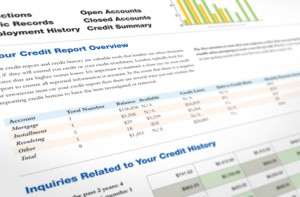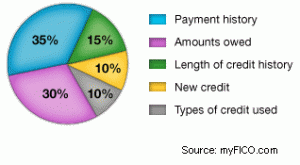 You may think your life is private, but when it comes to your financial life, it isn’t. Details of both your present and your past are stored in databanks at the three major credit reporting bureaus: Equifax, Experian, and TransUnion.
You may think your life is private, but when it comes to your financial life, it isn’t. Details of both your present and your past are stored in databanks at the three major credit reporting bureaus: Equifax, Experian, and TransUnion.
All this data is kept and used to compile your credit report – and from that report, the bureaus compile your credit score.
Although there are dozens of different credit scores for different purposes, the one that affects you most often is the FICO score. This is a score based on a formula developed by the Fair Isaac Company, and its function is to predict the likelihood that you’ll pay your bills on time- or not.
Your FICO score can be accessed almost instantly – which is why you can apply for credit in a retail store and be accepted or rejected within minutes.
The FICO score compiles the known information about your financial habits and turns it into a 3 digit number between 300 and 850. The higher your score, the better your chances of getting the credit you want – and getting it at the lowest interest rates available.
Credit reports and credit scores have evolved over the years. 40 or so years ago credit bureaus were small, local companies. They gathered information from your local creditors – and they also gathered information from local newspapers and “gossip lines.” Back then, you’d better not get a DUI or let the newspaper take your picture when you’re misbehaving, because it would go in your credit file! At that time, consumers could go to the credit bureau and pay a few dollars for a look at their own credit reports.
Then data collection became centralized and the small credit bureaus shut down. And policies changed a bit. When credit scoring became popular, the scores were hidden from consumers. Only the person or company that considered giving you credit could know your scores!
In 2001 that changed due to pressure from consumer groups and the U.S. Congress, so now every consumer has access to his or her FICO credit score directly from the credit monitoring agencies – for a fee, of course. And, as a result of new laws, each bureau must supply consumers with a copy of his or her credit report, without scores, once per year for free.
Why should you care about your credit scores?
Several reasons – the most obvious of which is that your credit scores directly affect your ability to get credit when you need it. Then, they directly affect the interest rate you’ll pay for that credit.
Low scores indicate to creditors that you’re a poor risk, so they will either deny you credit or make you pay dearly for it.
Credit scoring has contributed to the end of “personal” banking, in which your local banker granted credit based on your reputation in the community and the banker’s personal knowledge of you. Now, except in a few cases, the decision has been taken out of his or her hands and depends to a great extent on your credit scores.
However, when it comes to borrowing money, credit scores are not the only consideration. Other factors, such as job stability, income, the size of your bank account, the size of your down payment, and the reason why you are seeking credit are also considered. So, even with a high credit score, it is possible to be turned down for a loan.
The interest rate you’ll pay…
There’s a huge difference between the interest rate you’ll pay with high credit scores and low credit scores.
For a mortgage loan, there could be a difference of as much as 3 percentage points – which translates to about $200 per month on every $100,000 you borrow.
In car loans, the difference in interest rates is even more dramatic. For instance, if your credit score is under 600, you will pay in the range of 18 ½ %, while a credit score of 720 or above would allow you to buy the same car with an interest rate of about 6 2/3%. In other words, you’ll pay almost three times as much interest if your scores are low.
The payment on a 4-year, $20,000 car loan goes up about $10 per percentage point, so with good credit you’d pay about $475 per month, while bad credit would get you a payment of nearly $600.
Why do lenders look at all three credit scores?
When you access your credit report and credit scores, you’ll probably find that while the numbers are similar, each credit bureau will report a different 3-digit score. This is because some creditors report to one bureau and not the others. Thus, the information they use to determine your score is different from one bureau to the next.
This is why most mortgage companies use your middle score in making their determination.
A few points make a difference…
It’s interesting to note that when credit decisions are automated, just a point or two can make a difference in the interest you’ll pay. Banks have their “cutoff points” that determine the interest rate they’ll offer you.
Even with good credit, you may pay 1/8% less if your average score is, for instance, 720 rather than 719. Thus, it pays to keep your credit scores as high as possible.
Credit scores affect even more aspects of your life.
Do you want to carry a cell phone or watch satellite or cable TV? Your credit scores will determine whether you are allowed to do so. When those companies give you a “free” cell phone or install “free” equipment to access television programs, they want assurance that you’ll continue to pay throughout your one or two year contract with them. They’ll use your credit scores to determine that risk.
If you want to rent a house or an apartment that’s handled by a management company, you’ll probably have to give them permission to access your credit scores. They’ll decide whether or not they want to rent or lease to you based on your credit scores. Poor credit might mean you’ll leave in the middle of the night – owing back rent.
When you apply for a job, many employers will require that you grant them permission to see your credit report and credit scores. They’ll judge your reliability and trustworthiness based on the scores. In some sensitive jobs, low scores automatically mean you won’t be hired – or you will be fired!
How are credit scores compiled?
As we mentioned, there are dozens of different kinds of credit scores, each with a different purpose. Each has its own formula, and that formula is a trade secret.
But the credit bureaus have let us in on the general break-down of information that is used to determine a FICO score.
The most weight, 35%, is given to your past payment history. Lenders want to know if you pay your bills on time, and if you’ve had collections, bankruptcies, or foreclosures. If you do have negative items on your credit report, the most recent incidents do the most damage to your credit scores.
After 7 years, most negative information rotates off your report. Bankruptcies and foreclosures remain for 10 years.
Next, they want to see how much you already owe, so 30% of your score is based on how much credit you have available and how much of it you are using. If you have a pocket full of credit cards and most of them are at their limits, your scores will go down. If you keep that same pocket full of cards below 25% usage, your scores will go up.
Creditors like to know that you have a long history of being responsible with money, so the next 15% of your score is based on the length of time you’ve had credit. This is why we tell consumers not to cancel old credit cards, but to use them from time to time.
If you’re running around trying to get credit in numerous places, creditors see that as a bad sign, so 10% of your score is based on new credit and new credit inquiries. If you want to keep your scores high, don’t apply for several new credit cards within a short period of time, and don’t let a car dealer or mortgage lender access your credit report until you’ve made the decision to buy. Several inquiries from car dealers or lenders within just a few weeks will count as one inquiry, so it is safe to shop once you’re ready to buy.
Lenders also want to see that you can handle multiple credit accounts, and different kinds of credit. So the final 10% of your score is based on the types of credit you have. It’s best if your credit report shows experience with both installment loans and revolving credit accounts.
Raising your scores…
As you can see, keeping your scores as high as possible is in your best interests, and most of the factors that affect your credit scores are in your control.
You can:
* Pay your bills on time
* Limit spending to keep credit card balances below 25% of use
* Keep all your old credit accounts open
* Refuse to allow creditors access to your credit report until you’re ready to buy
* Refrain from opening multiple accounts in a short time frame
* Carry both installment and revolving credit accounts
The one thing you can’t do immediately is create a long history of credit use, but you can continue to build a good history that will serve you well in the future.
One more important step…
You can and should access your own credit report often to make sure there are no mistakes that could adversely affect your credit scores. While you can get a free credit from each of the credit bureaus each year, we believe you should be checking at least quarterly, and that credit monitoring is a good safety precaution.
Industry experts admit that up to 70% of all credit reports do have errors, so read your report carefully.
Some errors, such as a misspelling, won’t harm you. But if you have old negatives that haven’t been removed, or if a data entry person has accidentally entered someone else’s negative information under your Social Security number, you need to correct the error.
In addition, it’s important to watch for the red flags that signal identity theft. If your credit report shows that “you” have a new address or a new employer, or have applied for credit you know nothing about, look into it right away! Catching identity theft earlier can make repairing it far easier.
CreditScoreQuick.com
<!— AUTHCODE NQPWBLHDSNHK —>






